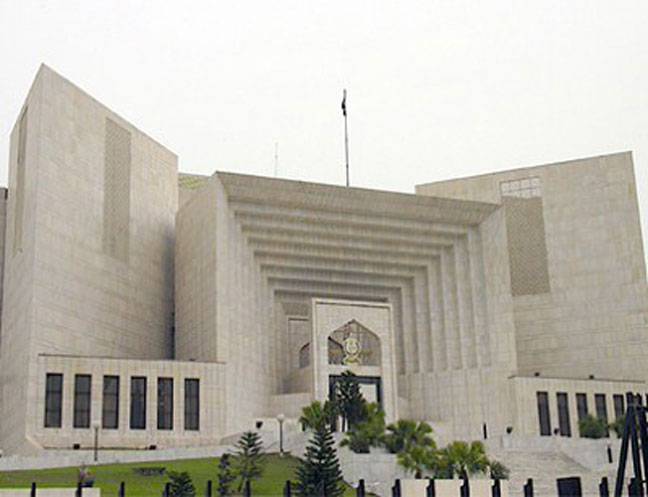ISLAMABAD - The Supreme Court on Tuesday suspended the Senate membership of former finance minister Ishaq Dar.
The top court ruled that Dar’s notification shall stand suspended until his arrival. The court also adjourned the hearing of the case which will be taken up again after Eid.
Dar’s notification is suspended after he failed to appear before the top court despite the bench’s relief to the extent that he shall be granted interim bail so that he may not be arrested.
Pakistan People’s Party’s Nawazish Ali Pirzada had challenged Dar’s nomination papers for election of Senate on the grounds of being an absconder from the Accountability Court wherein a corruption reference against him is pending adjudication.
A three-judge bench headed by Chief Justice Mian Saqib Nisar took the appeal for hearing during which the bench asked about the presence of Dar in the court.
During the course of hearing, the bench was informed that Dar was unable to appear due to his poor health. It was further informed that a medical report had also been submitted in this regard.
Justice Ijazul Ahsan, member of the bench, observed that according to news reports Dar was healthy and recuperated.
According to the medical report, senator-elect Ishaq Dar has been suffering from chest pains resulting from a spinal issue in his neck and may require surgery if his condition does not improve within a month
Dar has been in London since October last year after the National Accountability Bureau (NAB), in the wake of Panama Papers verdict, filed a reference against him on account of allegedly possessing wealth beyond known sources and accountability court declared him an absconder.
In March, Dar was elected as senator as an independent candidate following the top court’s order on the Election Act 2017 ruling that Pakistan Muslim League-Nawaz (PML-N) Quaid Nawaz Sharif cannot head political party and all decisions following his disqualification stand null and void.
The petitioner had prayed the top court to direct the Election Commission of Pakistan (ECP) not to issue notification of Ishaq Dar till the final adjudication of his petition.
Pirzada in his petition had contended that Dar was declared an absconder by the Accountability Court on December 11, 2017.
In a previous order, the top court had asked Dar as to whether he can be allowed to contest elections under Article 62(1)(d) of the Constitution.
Dar in his reply to the top court had contended that there was no provision of law which could bar an absconder from contesting the elections.
In his 10-page reply, he contended: “A person can only be debarred from contesting the elections if his case falls squarely within the strict scope of the qualifications and disqualifications stipulated by the constitution and by law.”
“No such proceedings were or have been initiated before any competent forum by the Appellant (Pirzada) in respect of the ground of disqualification being urged nor is there any valid, final and binding determination, declaration against the Answering Respondent (Ishaq Dar) in respect of the allegations levelled in the titled appeal,” the reply stated.
He had further added that allegations pertaining to ‘pre-election’ qualification of a member of Parliament, as provided for in Article 62 (1), cannot be raised or made after holding of the elections.
Dar, through his counsel Salman Aslam Butt, submitted: “A person can only be debarred from contesting the elections if his case falls squarely within the strict scope of the qualifications and disqualifications stipulated by the constitution and by law.”
“No such proceedings were or have been initiated before any competent forum by the Appellant (Pirzada) in respect of the ground of disqualification being urged nor is there any valid, final and binding determination, declaration against the answering respondent (Ishaq Dar) in respect of the allegations levelled in the titled appeal,” the reply had stated.
The election laws and more particularly disqualification provisions geared towards disenfranchising a candidate and depriving him of a valuable right of franchise guaranteed under the Constitution are to be construed strictly, the reply stated adding any ambiguity therein is to be resolved in favour of the candidate who could be permitted to participate in the electoral process.






